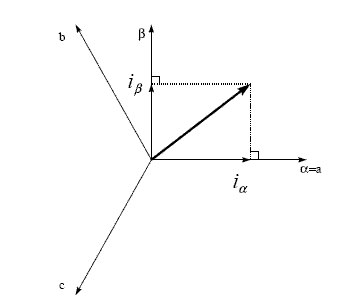 |
CMSIS-DSP
CMSIS DSP Software Library
|
 |
CMSIS-DSP
CMSIS DSP Software Library
|
Functions | |
| void | arm_clarke_f32 (float32_t Ia, float32_t Ib, float32_t *pIalpha, float32_t *pIbeta) |
| Floating-point Clarke transform. More... | |
| void | arm_clarke_q31 (q31_t Ia, q31_t Ib, q31_t *pIalpha, q31_t *pIbeta) |
| Clarke transform for Q31 version. More... | |
Forward Clarke transform converts the instantaneous stator phases into a two-coordinate time invariant vector. Generally the Clarke transform uses three-phase currents Ia, Ib and Ic to calculate currents in the two-phase orthogonal stator axis Ialpha and Ibeta. When Ialpha is superposed with Ia as shown in the figure below

and Ia + Ib + Ic = 0, in this condition Ialpha and Ibeta can be calculated using only Ia and Ib.
The function operates on a single sample of data and each call to the function returns the processed output. The library provides separate functions for Q31 and floating-point data types.

Ia and Ib are the instantaneous stator phases and pIalpha and pIbeta are the two coordinates of time invariant vector. | [in] | Ia | input three-phase coordinate a |
| [in] | Ib | input three-phase coordinate b |
| [out] | pIalpha | points to output two-phase orthogonal vector axis alpha |
| [out] | pIbeta | points to output two-phase orthogonal vector axis beta |
| [in] | Ia | input three-phase coordinate a |
| [in] | Ib | input three-phase coordinate b |
| [out] | pIalpha | points to output two-phase orthogonal vector axis alpha |
| [out] | pIbeta | points to output two-phase orthogonal vector axis beta |